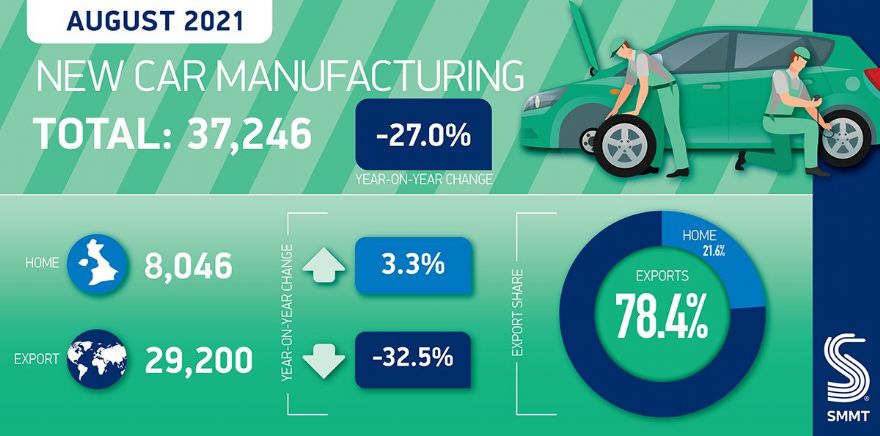
UK car production fell 27.0% in August, the second consecutive month of decline, with 37,246 cars manufactured, according to the latest figures released today by the
Society of Motor Manufacturers and Traders (SMMT).
Output was affected by the continuing global shortage of semiconductors leading to production stoppages, as well as the timing and length of some manufacturers’ summer factory shutdowns.
Despite the challenges, production of the latest battery electric (BEV), plug-in hybrid (PHEV) and hybrid (HEV) cars surged to a new high, representing more than a quarter (27.6%) of all cars made, equivalent to 10,274 units. It means UK car factories have turned out 137,031 alternatively fuelled cars since January, 51,679 more than the same period in 2020.
While manufacturing for the UK market increased 3.3% in the month, the rise was equivalent to just 255 additional units and exports fell dramatically, down 32.5%. 29,200 cars were shipped overseas, with the decline driven by falling exports to faraway markets including Australia, the USA and China down 74.9%, 65.7% and 58.7% respectively. Exports to the European Union held up better, down 4.9%, accounting for almost seven in every 10 cars exported in August.
Production in the year-to-date remains up, by 13.8%, to 589,607 cars, driven by exports with 83.2% of everything made heading for markets abroad. The performance, however, must be set in context against a Covid-19-hit 2020 as it remains significantly lower, by 32.0%, than in 2019. The total is 42.8% down, equivalent to 440,920 fewer units, when compared against the five-year average for the first eight months of the year.3
Mike Hawes, SMMT chief executive, said: “Another significant decline for UK car production is extremely worrying both for the sector and its many thousands of workers nationwide. While not the only factor at play, the impact of the semiconductor shortage on manufacturing cannot be overstated. Carmakers and their suppliers are battling to keep production lines rolling with constraints expected to continue well into 2022 and possibly beyond.
“Job support schemes such as furlough have proven such a lifeline to automotive businesses yet its cessation today comes at the worst time, with the industry still facing Covid-related stoppages which are damaging the sector and threatening the supply chain in particular. Other countries have extended their support; we need the UK to do likewise.”
Meanwhile, UK engine production also fell by 23.6% in August. UK factories made 81,266 engines last month, a decline of 23.6% over a Covid-19 impacted August 2020. Demand from both domestic and export markets fell by 27.0% and 21.8% respectively. Year-to-date engine manufacturing increases by 3.9% to 1,140,058 units compared to 2020 but remains 33.0% below the five-year average.
Mr Hawes added: “Further declines in engine production in August are very worrying when viewed in context against last year, when lockdowns and depressed global demand stalled output. However, the worldwide shortage of semiconductors – itself caused by Covid issues globally - continues to throttle vehicle production, putting automotive jobs and livelihoods at risk.
“It is vital that the Government take urgent action, such as extending coronavirus job support schemes, and introducing measures to improve competitiveness to assist the sector.”